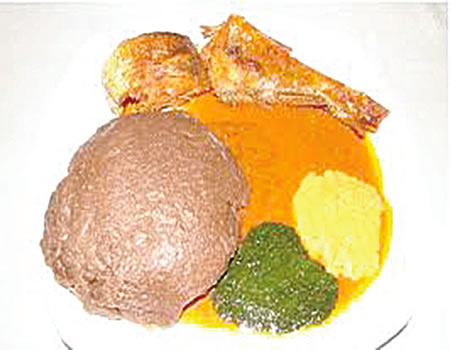A BULA is an African soup which is common in Yorubaland, especially in Ibadan. It is simply the combination of ewedu and gbegiri soups. It is called abula because of the way it is served mixed. The soup is poured directly on the amala after making a hole in it. It is best savoured when hot.
Today an Oke-Ado, Ibadan based food seller famously called Mama Okiki will tell us how to prepare abula.
Q: Can you speak on Amala with Abula?
It is amala with combination of two special Yoruba soups—gbegiri and ewedu.
Q: What are the ingredients used to prepare Abula?
They mainly include:
Beans and locust beans
Ewedu leaves
Yam flour
Palm oil
Pepper and onion
Salt and seasoning cubes
Melon and potash
Crayfish and ponmo
Turning stick.
My recipe is unique because I mix a bit of melon with the ewedu.
Q: How do you prepare Abula?
Gbegiri
Blend the beans softly. Then, wash and separate the white part from dirt. Place a pot of water on fire and allow it to boil for some minutes. Add pepper and palm oil. Use cooking broom to mash it together. Then seive out the seeds. Add crayfish and ponmo.
Put back on fire and add your salt and seasoning. The gbegiri will be ready in a few minutes.
Ewedu
Add a tea spoon of potash to boiling water. Then, put the washed ewedu leaves into a blender with a little warm water and blend. Add the blended leaves into the boiling potash water. Add ground crayfish, a bit of melon, locust beans, seasoning and salt. Allow the content to boil for some minutes and the ewedu will be ready.
Amala
Pour some quantity of water in a pot, depending on the quantity you want to prepare, and heat it to boiling point. Add yam flour and stir rigorously with a turning stick till it is thick. Add little warm water and leave to heat for five minutes. Continue to stir properly with the turning stick till it becomes smooth.
The amala is ready.
For a memorable culinary experience, amala is better served hot with gbegiri and ewedu properly mixed together, all in one plate—as is preferred by many who relish this kind of Yoruba delicacy.






